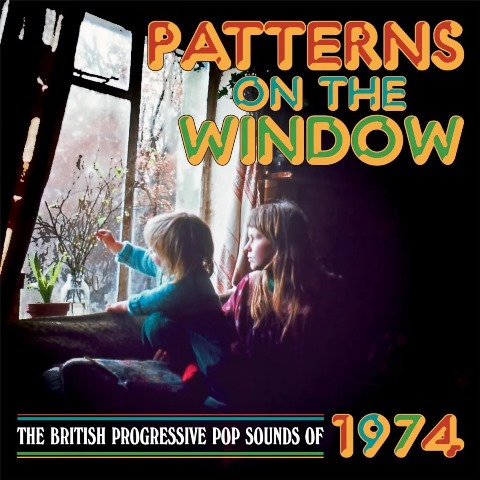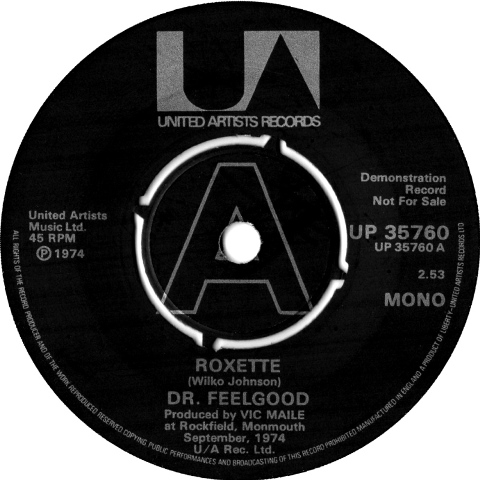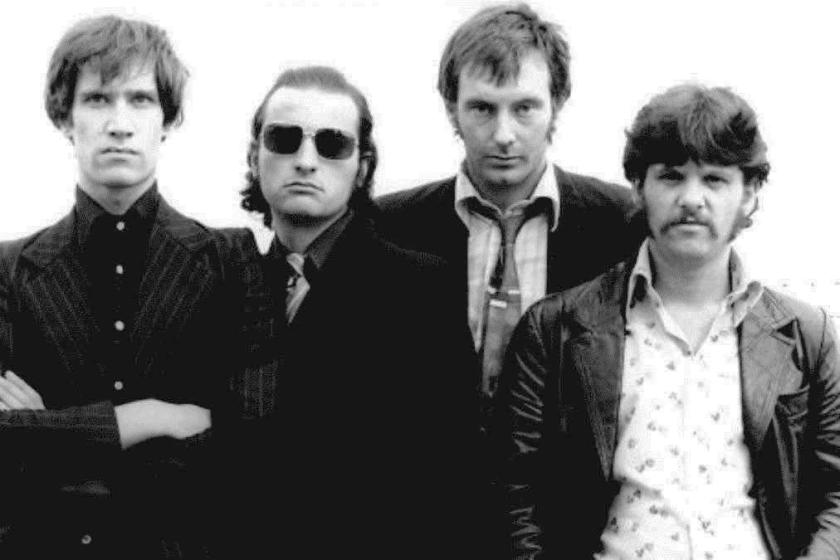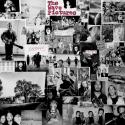Half-way through this three-CD set, the energy level suddenly shifts upwards. It’s just one track of the 67 collected, but in this context this basic, blunt recording stands on its own. Issued in October 1974, Dr. Feelgood’s debut single “Roxette” was an early sign that British music could change, needed to change.
Along with “Roxette,” Patterns on the Window - The British Progressive Pop Sounds of 1974 features a few other tracks associated with the back-to-basics pub rock phenomenon: Ace’s soul-rock hit “How Long,” Brinsley Schwarz’s “The Ugly Things” and Kilburn & The High Roads's “Rough Kids.” But none of these have the high-energy attack which would, in time, tie-in Dr. Feelgood with helping to birth punk rock. Ian Dury’s Kilburns were an influence on punk and the Brinsley’s Nick Lowe, through his association with Stiff Records, was embedded in capturing the studio sound of punk, but it was the bare-bones directness of “Roxette” which unequivocally pointed forwards. And, if the word “progressive” is about advancement, then this is the adjective applying to the Dr. Feelgood of 1974.
 Using “progressive” in this sense, it’s uncertain whether Britain’s pop and rock was advancing in 1974. As the year began, Slade’s “Merry Xmas Everybody” was at number one. As it ended, Mud’s “Lonely This Christmas” was in the top spot. Both best-sellers (not collected here) indicated that bands helped along by glam could have some resilience. However, as glam originators T.Rex showed, the bloom was fading. Their four 1974 singles, from “Truck (on Tyke)” to “Zip Gun Boogie” were increasingly less successful. Marc Bolan and his band are on Patterns on the Window with “Venus Loon,” which opened the Zinc Alloy And The Hidden Riders Of Tomorrow album, but it and the year’s 45s confirmed the downslide in fortunes.
Using “progressive” in this sense, it’s uncertain whether Britain’s pop and rock was advancing in 1974. As the year began, Slade’s “Merry Xmas Everybody” was at number one. As it ended, Mud’s “Lonely This Christmas” was in the top spot. Both best-sellers (not collected here) indicated that bands helped along by glam could have some resilience. However, as glam originators T.Rex showed, the bloom was fading. Their four 1974 singles, from “Truck (on Tyke)” to “Zip Gun Boogie” were increasingly less successful. Marc Bolan and his band are on Patterns on the Window with “Venus Loon,” which opened the Zinc Alloy And The Hidden Riders Of Tomorrow album, but it and the year’s 45s confirmed the downslide in fortunes.
Despite the fate of its prime progenitor, 1974’s glam – or glam-ish – new contenders included Be-Bop Deluxe, Cockney Rebel and Sparks (who were UK based). They each drew from styles which had been defined in 1972, then refined in 1973. That doesn’t undermine what’s heard from them here: “Jet Silver and the Dolls of Venus,” “Judy Teen” and “Hasta Manana Monsieur” respectively. There was also Hello, whose fun autumn 1974 hit “Tell Him” is collected. Unlike the previous three bands or their leaders, they would have no staying power.
 In contrast, the glam-influenced outfit which first charted in 1974 and went on to major post-1974 triumphs was Queen, whose singles “Seven Seas Of Rhye” and “Killer Queen” set them up for a dazzling future. They aren’t on Patterns on the Window. ABBA couldn’t be as the focus is UK bands and singer-songwriters, but their 1974 Eurovision win became the foundation of their impending accomplishments. Irrespective of merit, none of this suggests musical progression. There was the odd exception though, such as Hot Chocolate’s bleak, incomparable “Emma” (not heard here).
In contrast, the glam-influenced outfit which first charted in 1974 and went on to major post-1974 triumphs was Queen, whose singles “Seven Seas Of Rhye” and “Killer Queen” set them up for a dazzling future. They aren’t on Patterns on the Window. ABBA couldn’t be as the focus is UK bands and singer-songwriters, but their 1974 Eurovision win became the foundation of their impending accomplishments. Irrespective of merit, none of this suggests musical progression. There was the odd exception though, such as Hot Chocolate’s bleak, incomparable “Emma” (not heard here).
Dr. Feelgood aside – and, to a lesser degree, Kilburn & The High Roads too – Patterns on the Window makes it is hard to argue for 1974 as a year of musical innovation. Of course, a lot of fantastic music was released in 1974. Patterns on the Window includes The First Class’s “Bobby Dazzler,” Peter Hammill’s “Again,” Ronnie Lane’s “The Poacher,” Brian Protheroe’s “Pinball,” Slade’s “Far Far Away” and UFO’s “Doctor, Doctor,” all of which come from different perspectives, all of which endlessly satisfy. However, none of them help to define what was uniquely 1974, what delineated British pop and rock at this point, what set it apart from that of 1973 or even 1972.
As an early signpost, “Roxette” repurposed a minimalist Sixties model to revitalise what live audiences were experiencing: similar in spirit to the later Stiff Records slogan “reversing into the future.” Otherwise, much of British pop and rock was in a form of holding pattern at this point. It took a while, but the marker set by Dr. Feelgood's first single would become pivotal. Perhaps, then, this is 1974’s musical legacy.
- Next week: Congo Funk! - Sound Madness From The Shores Of The Mighty Congo River (Kinshasa/Brazzaville 1969-1982)
- More reissue reviews on theartsdesk
- Kieron Tyler’s website















Add comment